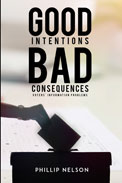
 |
Good Intentions—Bad Consequences: Voters' Information Problems
by Phillip Nelson
PageTurner Press and Media
A professor in the field of economics focuses intently on why voters make the choices they do and how this can affect their lives and the lives of those around them. Nelson identifies two main types of voters: those who vote from a sense of what he terms naïve altruism and those who vote from self-interest. Both may be influenced by varying factors or by simply talking with others of a like mind. In general, voters do not have the information needed or do not access it to make sensible choices. Because academia and most media sources support altruistic motivations, the real results of one's vote may be hard to determine. An altruistic naïve thinker may believe that voting for welfare programs and minimum wage policies will help the greatest number of poor people without realizing how such programs distribute money or how large corporations may manipulate such funding.
Nelson has investigated these issues carefully, referencing various studies and sources that would not usually be available to the average reader. His research and his ability to create a vivid portrait of the human-scale personality of average voters make his rational viewpoint comfortably accessible. He offers a lengthy list of resources and cites the results of other explorations that support his views. One strong example mentioned several times is the situation regarding oil drilling in Alaska (ANWAR), in which, while many closest to the project saw its value in terms of employment and lower prices, those outside the region altruistically believed the project would be too ecologically damaging and therefore opposed it. Models like this and many more give Nelson's overall thesis credibility for those wishing to better inform themselves about making a vote count in the democratic process.